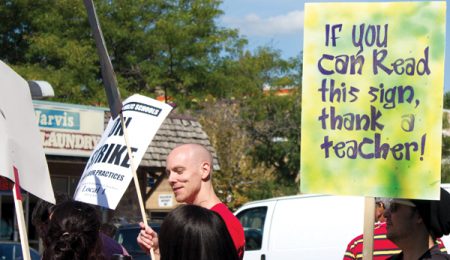I HAVE A bronze medal I keep in a banker’s box, not having found a place to put it since I moved. The words on it read, “Le concours d’art oratoire 2009.” I probably wouldn’t have it if it weren’t for my Grade 12 French teacher, Joanne Léger-Legault, who encouraged me to participate in the city-wide contest and to whom I owe at least a small part of my abiding commitment to the French language—and consequently, my decision to study at the University of Ottawa. But the public has come to know a much different side of her.
The story of her “inappropriate relationships” with male students has spread from the local to the national media. Although the last attested incident occurred during the 2005–06 school year, when I was, the story has had an impact on me, as it has on most of her students.
Many of them have reacted with emotions appropriate to her actions: Shock, disgust, and a sense of betrayal. But when I try to process the situation emotionally, I always get stuck on something.
Léger-Legault is not an evil person. She was one of the best teachers of my high-school career, an opinion I am not alone in holding. As I’ve spoken to former classmates, it’s become clear I’m not the only one grappling with the contradiction between the person I knew and the acts that prompted her dismissal.
How can a good teacher—someone who pushed me to succeed and who contributed in her own way to my development as a student and a person—commit what the Ottawa Citizen called “sexual abuse”?
This contradiction gets to the heart of the very nature of sexual abuse and statutory rape, and how it encompasses acts that go beyond our Criminal Code and our stereotypes about the kind of people who commit them.
On the most basic level, sexual abuse is any sexual act committed without the consent of all persons involved, and consent means more than just saying “yes.” I remember being told once that for consent to be meaningful, the person giving it has to be in a situation where they feel they can say “no.” The power relationship between a teacher and a student takes the ability to say no out of the equation.
Léger-Legault had power over these students. She held control over their grades, and their education more broadly, in addition to being privy to sensitive details of their private lives that some of them chose to confide in her. Did these considerations enter into their minds when she made sexual advances toward them? While no one can speak for the students in this case, Léger-Legault’s position of trust and authority could, and likely did, skew their responses.
The uncertainty of whether the students were coerced into sexual engagement with Léger-Legault is fundamental to the wisdom of exactly the rules she broke. There are reasons why teachers are held to a code of conduct above criminal law.
Beyond their implications for the teacher’s objectivity and the social taboos they break, sexual relations between students and teachers enter into a murky world where consent is twisted and deformed by power dynamics. It’s possible that Léger-Legault—and even some of the students she had explicit relationships with—saw nothing morally wrong in what she was doing, but that doesn’t take away from the gravity of her actions.
No one should ever be faced with the choice these students were. It’s about more than the specific circumstances of this or any other case of sexual abuse: It’s about power and its gross misuse.
—Eddy Roué




